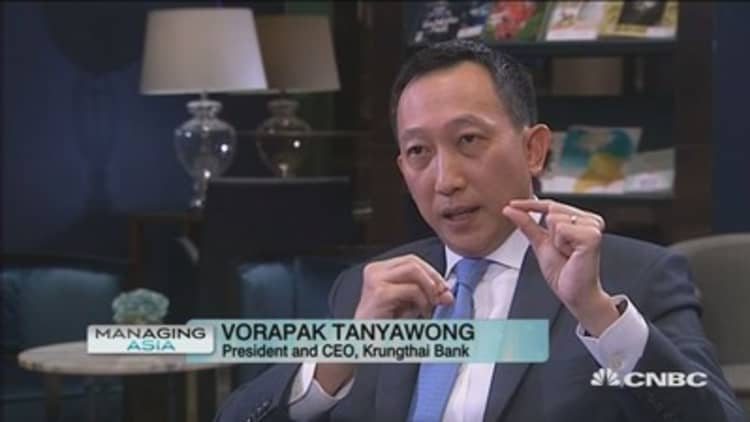
Having achieved his goal of making Krungthai Bank (KTB) the biggest lender in Thailand by assets in 2015, Vorapak Tanyawong is confident the state-owned bank can go on to overtake its rivals on profitability by 2018.
"The first summit, which means to complete all key foundations, starts from 2014. The second summit from 2016-2018 [aims] to close the gap with our peers in terms of margin and net yield growth. Based on our progress over the past three years, I'm quite confident [of achieving our target]," the CEO and president of KTB told CNBC's "Managing Asia."
Tanyawong is referring to the company's 7-year strategic plan, which consists of three "summits" or phases, aimed at enhancing the bank's capabilities in the areas of front office operations, credit approval, risk management and most importantly, human resources. After boosting its profitability by 2018, KTB has a final target: to become "the best place to work" by 2021.
Tanyawong launched the "KTB Transformation" project when he joined the bank three years ago, with the aim of "transforming the bank from inside." He tackled the state-owned mindset among employees by getting the labor union to agree on performance-based compensation and promotion. He also centralized the loan department so KTB could better expand into retail banking. This year, KTB surpassed its key rivals Bangkok Bank, Siam Commercial Bank and Kasikornbank to become Thailand's largest lender by assets, loans and deposits.
Read MoreHitachi CEO is CNBC's Asia Business Leader of 2015
For his achievements, Tanyawong was named "Thailand Business Leader of the Year" at CNBC's 14th Asia Business Leaders Award last month.
"I think the past three years has been a long journey for me. I cannot claim it is successful yet. My job is to turn this organization into a performance-driven organization and that involves a long of changes internally," he said.
The 49-year-old now wants to double the bank's net profit to 60 billion ($1.68 billion) within three years.
"We are the largest bank so like a glass of water, our glass is much bigger and is less full. Other banks' glasses are smaller and nearly full, which means huge opportunities [for us]," he said.
But challenges abound. Aside from a stuttering Thai economy that is curbing loan growth, the issue of souring debts is exacerbated by KTB's exposure to troubled steelmaker Sahaviriya Steel Industries (SSI). SSI last month became Thailand's largest corporate debt defaulter since the 1997 Asian financial crisis, after it shouldered losses from a U.K. subsidiary it bought in 2011. KTB is one of three main creditors that loaned SSI money for the British acquisition.
Hurt by higher provisions on non-performing loans (NPLs), KTB posted a profit of 5.35 billion baht for the third quarter, down significantly from 9.26 billion baht for the same period a year ago.
NPLs stood at 91.5 billion baht, up 35 percent from the previous quarter, with NPLs related to SSI at 23 billion baht. Meanwhile, NPLs rose to 4.03 percent of the bank's total lending in the July-September quarter, the highest since 2010, according to a Reuters report.
"Most analysts can see from the third-quarter results that approximately 6 billion baht is set aside because of the SSI case so the bottom line [for] this year will definitely be lower because of the impact from this case," Tanyawong said.
Read MoreHow Thailand could really boost its economy
"But if you look at the real operating result, you will see an across-the-board improving trend in terms of interest income and non-interest income from sectors [such as] retail banking as well as, small and medium companies."
Looking ahead, Tanyawong, who joined KTB from Finansa Securities where he was chairman and CEO, reckons 2016 will be a better year, if not necessarily much easier.
"I'm glad [that] all the trouble has been cleared away in 2015 and we are hopeful that we'll have a better year in 2016. If we exclude the Sahaviriya case, we can see NPL from retail banking starting to stabilize," he told CNBC.
"Having said that, 2016 will not be an easy year for the global economy ... so it makes sense for the government to materialize their mega-infrastructure investment project next year. If yes, sentiment will improve and trigger the good supply share effect," he added.


